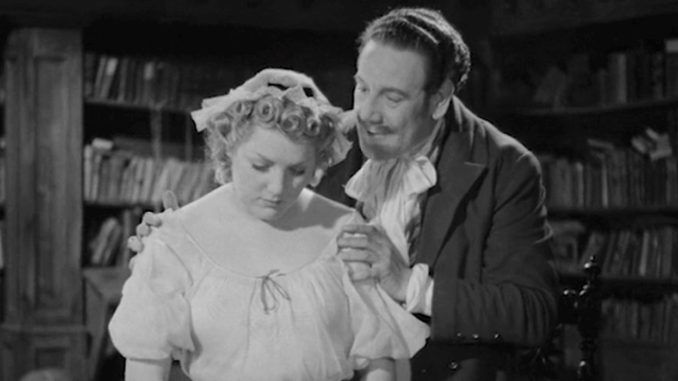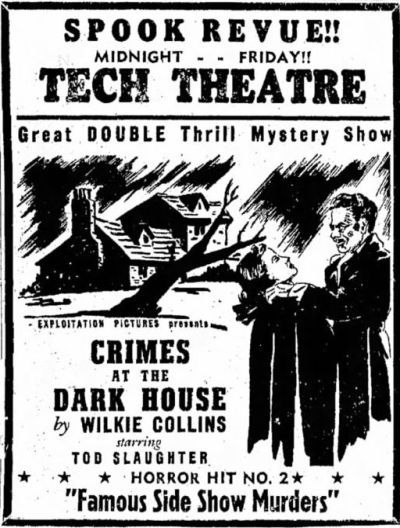
Rating: B
Dir: George King
Star: Tod Slaughter, Sylvia Marriott, Hilary Eaves, Hay Petrie
Despite the title, this is actually an adaptation of one of my favorite book, classic Gothic novel The Woman in White, by Wilkie Collins. This has been adapted frequently into other media. We previously reviewed the 1948 film version. The retitling initially seemed weird, like an attempt to hide the source. Yet it wasn’t long before it made perfect sense, since it’s a radical enough reworking to merit its own name. In the book, evil aristocrat Sir Percival Glyde’s dark secret is he’s illegitimate, and so not entitled to the estate he has claimed. Here, he’s an impostor (Slaughter). He murdered the emigrant lord, who had been in Australia for decades, after learning of an inheritance, returning to England in his place.
Unfortunately, the inheritance is mostly debts. But a possible out is a previously arranged marriage to rich heiress Laurie Fairlie (Marriott). However, doing so will require “Sir Percival” – take the quotes as read hereafter – to deal with everyone who can expose his fraud, through bribery or murder, as well as the clingy servant girl he has been banging (top). The film does retain the novel’s titular lunatic, flitting around the grounds in her Gothic nightie. She is a lookalike for Laurie, a fact Sir Percival uses to his advantage. But in place of the book’s multiple viewpoints, this is largely told from the antagonist’s perspective. It’s also significantly stripped-down, out of necessity, to fit into the 69-minute running-time.
 There is no real secret here either. Right from the start, we are entirely aware Sir Percival is an impostor. This is because we see him murdering the real one, by hammering a tent peg into the sleeping lord’s ear. The tension instead comes from whether this will be discovered, by anyone he can’t bribe – which excludes highly buyable local physician, Dr. Fosco (Petrie) – or bump off in the nearby boathouse. Slaughter is incredibly fun to watch, ramping up the melodramatic villainy to eleven, snarling lines like “I’ll feed your entrails to the pigs!” to his accomplice. He occasionally reaches twelve, such as on the night of his wedding to Laurie. Rarely has a fade to black been more laden with sordid overtones.
There is no real secret here either. Right from the start, we are entirely aware Sir Percival is an impostor. This is because we see him murdering the real one, by hammering a tent peg into the sleeping lord’s ear. The tension instead comes from whether this will be discovered, by anyone he can’t bribe – which excludes highly buyable local physician, Dr. Fosco (Petrie) – or bump off in the nearby boathouse. Slaughter is incredibly fun to watch, ramping up the melodramatic villainy to eleven, snarling lines like “I’ll feed your entrails to the pigs!” to his accomplice. He occasionally reaches twelve, such as on the night of his wedding to Laurie. Rarely has a fade to black been more laden with sordid overtones.
The rest of the cast are more of a mixed-bag. To be fair to Marriott, the script does follow the book in making Laurie much less interesting than her sister, Marian (Eaves). The latter is definitely the smarter one, though here, largely acts as her sibling’s moral spine. This is most obvious in the scene where Sir Percival is trying to get his bride to sign over her fortune to him. Only the fortuitous arrival of Marian prevents this disaster from becoming legally binding. But if there is a moral here, it is that it’s probably best not to confess a litany of crimes, up to and including murder, unless you have first carefully swept the area for accidentally eavesdropping relatives. Otherwise, a fiery doom is inevitable.
